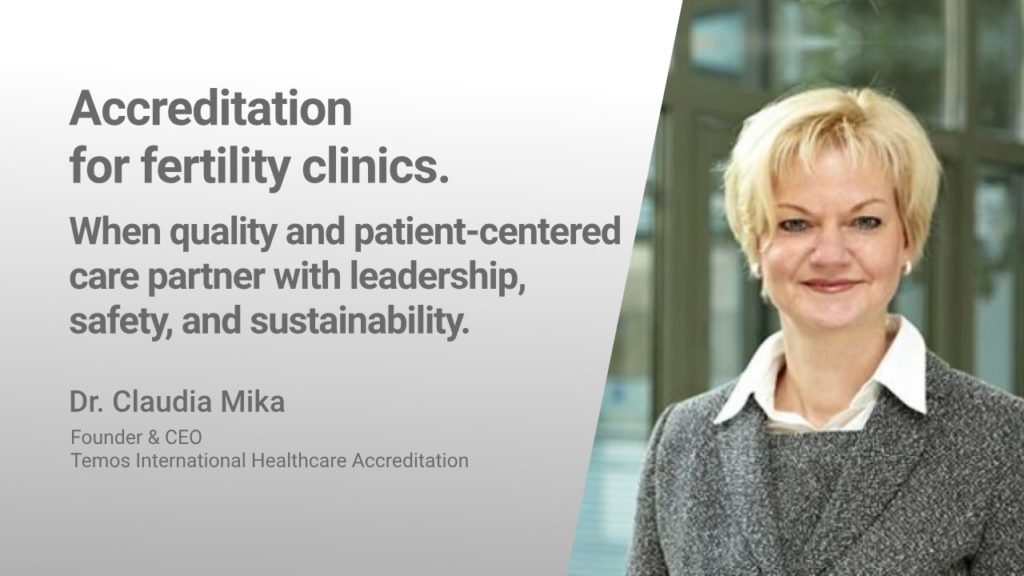Table of Contents
Dr. Claudia Mika is the Founder and CEO of Temos International Healthcare Accreditation, a German-based international accreditation body that assesses hospitals, clinics, rehabilitation centers, reproductive care centers, and dental clinics worldwide. Today we bring you the article from Dr. Mika on quality of IVF clinics and patient-centred approach that partner with leadership, safety, and sustainability.
Fertility clinics have been largely ignored by international accreditation organizations, preferring to treat them the same as general ambulatory care centers. This approach ignores the specific clinical and laboratory services unique to reproductive care as well as the elements of the patient experience that IVF clients require. In 2019, Temos introduced its accreditation program for reproductive care centers to fill the need for specialized standards for IVF clinics and the clients they serve. Here is why accreditation plays an essential role in improving the quality of care delivered by IVF clinics and reproductive care centers.
Why accreditation?
Accreditation has a clear mission to improve the overall quality of healthcare and patient experience services offered by a clinic or hospital. Accreditation itself is a process that sets out best practices called “standards” that the clinic or hospital must demonstrate that it satisfies through a review process by the accreditation organization. These standards are based on scientific research, well-established best practices, experience, as well as innovation. It is a cooperative, voluntary process between the accreditation organization and the clinic or hospital to enable the healthcare provider to maximize its capabilities as well as a commitment to continuous quality improvement.
To demonstrate how the accreditation process works, let us look at two examples of the journeys of two different fertility clinics in different environments.
[button linking=”new_window” link=”https://www.myivfanswers.com/video/quality-standards-ivf-clinics/” align=”center” size=”medium” type=”standard” style=”solid” icon=”” title=”Register now!”]Watch the webinar “How to check the quality standards of IVF clinics”[/button]
Building on its strength: Fertility Clinic A
Fertility Clinic A has a strong international reputation in that it attracts clients from within the country as well as internationally. It is located in a country that has a positive brand as a safe tourism destination with a stable political system. Clinic A is busy serving patients, contributes to international science and research, and is financially successful. The clinic has been growing fast, with patient and staff numbers increasing.
The Managing Director realizes that when the team was small, communication was easy, and people knew what to do. During the last months with more patients and new staff, the number of complaints has increased. Staff members complain about long working hours plus they do not feel comfortable and sufficiently trained to deal with the different cultures they encounter every day. Common complaints from patients include long waiting times and unfriendly staff. It is time for a business intervention.
The Medical Director who reports directly to the owners is responsible for clinical outcomes and patient complaints is not happy with the new numbers being reported. The owners and Medical Director agree that the Clinic will function better with happier staff and patients if medical, clinical, and laboratory processes and procedures are standardized, followed, measured, reviewed, and improved.
Instead of engaging one or more consultants, the Medical Director and the owners decide to apply for accreditation as a holistic approach to receiving guidance by the accreditation standards and accompanying tools for self-assessment and the requested support for the re-structuring of the Clinic.
Temos standards address topics such as “medical services”, “assisted reproductive technology laboratory”, and “outcome and effectiveness”, “management of human resources”, “leadership”, “international patient management”, and “quality management” to help the Managing Director and staff review their current approaches to service delivery and paths forward to improve those services.
After successfully completing the accreditation process, Fertility Clinic A meets and exceeds its goals for clinical outcomes, patient satisfaction as part of the patient experience, revenue, and other indicators.
As an unexpected but much appreciated added value staff members reported after the onsite visit that cross-departmental team meetings that were implemented to work on the standards during the preparation, were of great value and motivation to all and are continued since then.
Fulfilling its vision: Fertility Clinic B
Fertility Clinic B, located in a CIS country, is well known nationally. It is busy but has the capacity to serve more patients. The Clinic is managed and owned by the same person, an ethical and quality-oriented CEO. Her vision is to become a state-of-the-art fertility clinic that can compete on the international level. She wants to ensure that the Clinic has the same standards for clinical outcomes, laboratory services, infection prevention, and non-clinical services to make it a regional destination for infertility treatment services.
Clinic B’s technical infrastructure and laboratory equipment are adequate and well-maintained. Due to language barriers, regular training and education programs from international sources are limited, preventing the Clinic’s team from meeting their goals for numbers of procedures as well as clinical outcomes. The CEO looks at the available resources to help her and her team achieve her vision for Clinic B.
The CEO contacts Temos to start the application process for international accreditation to become the first accredited fertility clinic in the country. The staff is excited and afraid at the same time, not sure of what to expect. Step by step, the accreditation standards are translated, and assistance provided to help Clinic B implement the standards. Temos headquarters, as well as its CIS regional office, works with Clinic B each step of the way. Quality management and documentation system are implemented based on defined outcomes, assigned responsibilities, and more. Processes and procedures are compared to international state-of-the-art standards and adjustments and improvements made as needed.
Regular training and education take place so that staff becomes familiar and comfortable with the new way of delivering services. As a result of these efforts, Clinic B successfully passes the accreditation and celebrates its accomplishment with a big party. Then it launches marketing to promote its achievement. It is ready to welcome more domestic clients as well as its first international patients.
[button linking=”new_window” link=”https://www.myivfanswers.com/video/quality-standards-ivf-clinics/” align=”center” size=”medium” type=”standard” style=”solid” icon=”” title=”Register now!”]Watch the webinar “How to check the quality standards of IVF clinics”[/button]
The accreditation journey
Accreditation is an ongoing story, engaging all staff members in the continuous quality and service improvement of the clinic. This journey improves the quality and efficiency of the clinical and non-clinical services resulting in measurably better outcomes to benefit its clients, employees, and owners.
The Temos accreditation process starts with a simple registration process followed by an agreement that is signed. Then the hard work begins. Our clients receive access to the secure and private online platform, the standards, and accompanying online self-evaluation tools. The self-evaluation process enables the clinic to view its progress as it demonstrates systems and processes that meet each standard. The Temos team helps when needed. When the client indicates readiness for assessment, the client and Temos assessment team prepare for the onsite visit.
The Temos on-site visit is conducted by a team of experts, typically a clinician such as a doctor or an embryologist as well as an expert in quality management. Temos has a team of culturally diverse, multi-lingual, highly qualified assessors with experience in more than 100 countries. The assessor team shares its knowledge and experience while exercising cultural sensitivity when evaluating each clinic.
Following the on-site visit, suggestions or recommendations are made to improve services to fully comply with the standards. The accreditation is awarded. It is valid for three years; however, once a year, clients deliver updates to confirm continuing compliance with the standards as well as to report any major changes to services or governance.
Accreditation: Confirmation of international excellence
During the COVID-19 pandemic and moving forward into the future, clients increasingly expect that reproductive care services will be offered according to clinically accepted best practices. They look to accreditation to verify that the clinic is committed to excellent clinical outcomes, patient and staff safety, improved hygiene standards, an excellent patient experience, and more.
As we can see from the above examples: it is worth a try!






I’m 39, and I don’t know how much more I wanted to do. I’ve wanted kids for my entire life. Career aspirations starting at 16 – Stay at home mom. We were on the waiting list for the funded IVF. But we could have to wait up to three years for our turn. I don’t know if I would want to just be starting out at 42 with a baby. Honestly though, at this point I know we would never have been happy without kids. We would have travelled instead. And maybe moved to a different house. Just instead of the house we picked out for raising kids in… This all takes a lot of time. Unless your inner part understands this is all you want. I’m glad I’ve found this site. Hoping to get even more answers here.
PS Are currently considering going to Ukraine for IVF. Time will show though..
Thank you for sahring. Just wanted to say that I’m very wary of clinics that use ICSI unnecessarily. There isn’t an evidence base for it to be used outside of male fertility issues. ICSI involves visual appraisal of sperms to choose the ‘best’ sperm. It requires expert selection. Nature has its own expert selection process. There’s no need to interfere with it unless there is an issue with sperm. So that’s the huge factor for me. Then one should check the clinic’s live birth rates. (Not success rates!!) Then, from my own experience, you should feel comfortable with the place you’ve been treated in. Having docs and nurses supportive and understanding definitely helps in the long run!! And if there’s even a single thing which makes you doubt about using the clinic, it’s always better to think things over and probably look for some other place. We got success in Ukraine after shot#2 resulting in a beautiful DD. Looking back I can say without hesitation it was the best choice made ever. Guys had been always professional and just amazing people. All the best to all on the path.